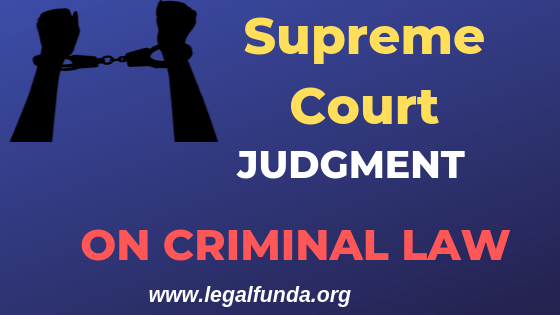Top Supreme Court judgment on criminal law
Howdy readers in this I will show you top Supreme Court judgment on criminal law

1.Lalita Kumari v. State of UP
In this Supreme Court directed that registration of FIR is mandatory in cognizable case.
2. Mohd. Ahmad Khan vs Shah Bano Begum
In this case, the supreme court had ordered that Muslim women can also file a case under Section 125 of Indian Penal Procedure (Cr.P.C.) for maintenance from their husbands.
3. D.K. Basu v. State of Bengal
In this case, the supreme court had issued very important guidelines in which it was clear that if a person is arrested then what is his right.
4. Nilabati Bahera v. State of Orissa
In the Nilabati Bahera case, the supreme court ordered that if a person is arrested illegally and kept in jail, he will be compensated.
5. Sheela Barse v. State of Maharashtra
Although the criminal law has given women rights related to arrest, even then the supreme court had issued some important guidelines in this case.
Important Supreme Court top judgment on criminal law
7. Chanmuniya v. Virendra Kumar Singh Kushwaha
When a couple lives in a live-in relationship, the woman has no rights, but in this case the Supreme Court clarified that the woman living in the live-in can also file a case for maintenance.
8. Satya Pal Singh v. State of MP
It was usually that if a victim dies then the case is over, but in the case of Satya Pal Singh, the supreme court clarified that his father would have the right to appeal when the victim died.
9. CBI v. Anupam J. Kulkarni
Difference between summon and warrants
In this case, the Supreme Court ordered that the police cannot keep any person in the police remand for more than 15 days.
10 Shakuntala Devi v. State of U.P.
Cr.P.C. Under section 200, any person can file a criminal complaint against someone else in the court, this complaint can be filed only in the case where there is no FIR. The Supreme Court made it clear in the case of Shakuntala Devi that even if a person has a civil remedy, he can complain under section 200.
11. Dina Nath v. Emperor
The Supreme Court ordered in this case that the summary trial cannot go on in any serious or complex case.
12 Surendra Singh v. State of UP
Normally, in the appellate court, two judges hear the case, in which case the Supreme Court ordered that if a judge writes a judgment in a case and if he dies before he is heard, the second judge will give that decision. Can not hear
13 Naresh v. State of UP
Generally, when a court sentences a criminal, that criminal has the right to appeal to a larger court. In this case, the supreme court made it clear that if a criminal has been convicted for section 302 (murder), then the High court cannot change that offense to 304 instead of section 302. Generally, the High Court can reduce the sentence of the person or absolve him.
14 Rasiklal v. Kishore Khanchand Wadhwani
In this case the Supreme Court clarified that Cr.P.C. The right to seek bail under section 436 is absolute
15 Gurbaksh Singh Sibbia v. State of Punjab
In this case, the Supreme Court had issued guidelines related to anticipatory bail.